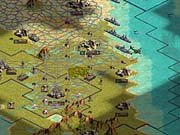With Firaxis' superlative Civilization III, that old-school, up-till-5am-addictive, and one-more-turn-based grand-strategy gaming that was introduced 10 years ago in the original Civilization is back. And it's back with a vengeance. This sequel to one of the greatest games ever, which was itself the sequel to one of the greatest games ever, lives up to its lineage. It is a paean to the principles of solid design, sleek interface, sharp artwork, unlimited replayability, open architecture, and epic storytelling. It is yet another example of Sid Meier and company's cunning insight into what makes games good. Civilization III is, in short, a triumphant proclamation that strategy gaming is alive and well and still able to keep you rooted in front of your computer for hours at a time.

There are two ways to look at Civilization III: either as it stands on its own, or as the most recent version in the evolution of a line of games stretching back to Sid Meier's original Civilization. As the latter, it's immediately clear that Civilization III's apple hasn't fallen far from the tree. In fact, you might even be disappointed when you start your first game of what feels like a warmed-over version of Civ II. But this feeling fades with time. The more you play, the more you'll realize that the new game's seemingly subtle changes have a significant impact.
Many of these changes are carried over from Firaxis' Alpha Centauri, which introduced concepts such as unique factions, national borders, and a living map. All of these are present in Civilization III, but it isn't just Alpha Centauri with a historical setting. Although the game's various civilizations aren't as distinct as Alpha Centauri's factions, they each have a unique unit and two "strengths" that give them special advantages. The unique units, which are really just souped-up versions of common units, are useful for only a limited time. For instance, everyone eventually gets jet fighters, but the Americans can build F-15s that hit a little harder. However, this doesn't come into play until late in the game, during the modern age. Similarly, the Romans' legionaries are slightly better than the commonly available swordsmen, but this isn't much help once history progresses into the middle ages. Unique units have their brief moments in the sun of time, providing their civilizations with a temporary military ace up the sleeve.
The civilization strengths, on the other hand, tweak the basic rules and have long-term implications for how you play the game. For instance, when you play as the Babylonians, who enjoy their strengths of being "scientific" and "religious," you pay half price for scientific and religious structures, you get a free technology every time you enter a new age, and you can instantly change governments without a period of anarchy. You might not appreciate the impact of these bonuses until you're playing a civilization that doesn't get them. Suddenly, important structures cost more, technology doesn't come as easily, and you're not as flexible when it comes to changing governments. With your choice of civilization, the dynamics of the game vary just enough to make you sit up and take notice.
The concepts of national borders and a living map have advanced significantly since Alpha Centauri. Each city accumulates culture depending on what you've built. A 3,000-year-old city with an ancient coliseum, cathedral, library, and university will have a whole heap of culture, whereas a new backwater village with a small temple will barely register. This is important because borders extend from cities based on how much culture they have. With enough culture pushing them out, your borders can swallow neighboring cities and bring them into your empire. Civilization III models the seductive power of entertainment, art, and religion. It's a form of conquest with sitcoms, music, and priests rather than soldiers, and it adds an important new dimension to the game.

Another powerful and subtle difference is the role that the map plays in Civilization III. Terrain is no longer just a source of food, shields, and trade arrows. Rivers are a significant factor in combat and the development of cities, even well into the later game. Roads, railways, harbors, and airports connect your cities to each other and let you import goods from other civilizations. Cutting a certain stretch of road or blockading a particular harbor can plunge an entire civilization into panic or shut down the production of tanks, airplanes, and railroads. Because it's important to link to a certain resource, remote patches of land might take on new significance as the game progresses. The geopolitical shape of the world will shift as technology comes to rely on iron, then coal, then oil, then uranium. In Civ III, the map lives and breathes and drives the game. It's much more than simply a place to put your cities.
The computer's artificial intelligence is formidable, but it's not clear how much of this is due to "cheats," which are bonuses commonly given to make up for the fact that a computer AI can't see the big picture as well as a human can. Some suspicious things go on during the computer's turns. Units shuffle back and forth pointlessly as if they were patrolling. Twenty workers will march all at once to irrigate a single square. There'll be an awful lot of outdated troops loitering around the AI's empires as the 20th century rolls around. But on the whole, the computer is surprisingly capable of providing a smart and competent challenge. It seems to recognize the importance of strategic resources on the map. It will pillage important terrain improvements and attack in numbers, making good use of combined arms. In terms of diplomacy, the AI civilizations don't react as abruptly or unpredictably as they have in the earlier games. In fact, diplomacy in Civilization III is a slow, ponderous, and frail process. Two sides starting a war can drag their allies with them, and world peace can collapse like a house of cards. Civilization III features overnight cataclysms of World War I proportions.
In the evolution of strategy game design, Civilization III is clearly the best thing since Civilization II. If you've been playing these sorts of games all along, you're going to love it. And since it includes a comprehensive scenario editor, serious players are going to be cranking out mods and scenarios that give Civ III almost impossibly long legs. You'd be hard pressed to imagine a game with more replay value than this. There's no question that this a perfect holiday treat for longtime strategy gamers. But how will it play for the casual gamers who spell the difference between critical and commercial success?

On one hand, Civilization III is more streamlined than its predecessors. It still ramps up slowly, gradually introducing new game mechanics as you advance through time and technology. In fact, the technology tree has been pruned considerably. Research doesn't meander anymore. Instead, it passes through a series of choke points that determine which of the four ages your civilization is in. As time goes on, there's less disparity, and diversity, among each civilization's technology. The dilemma of science isn't so much which path to take--since there aren't many--but whether to linger in one age to explore all the optional dead ends or whether to make a beeline for the next age. Do you stick around the industrial age to discover amphibious assaults, paratroopers, helicopters, espionage, and communism? Or do you rush into modern times to get started on nuclear subs, space flight, and stealth bombers? The new pruned tech tree keeps science focused for new players while giving experienced strategy gamers enough choice to keep it interesting.
Things such as aircraft, trade, and espionage are also streamlined--unfortunately, espionage is so streamlined that it seems tacked on as a poorly documented afterthought. There's a new emphasis on gold, which has many more uses than it did in the previous games. The combat system is flexible and intuitive, presenting numerous options for combined arms without throwing a bunch of stats at the player. There are simple rules for complex ideas, such as defensive artillery fire, zones of control, retreats, air superiority, and unit experience. The interface keeps the map under your nose whenever possible. Overall, the game is easy to manage and full of Sid Meier's trademark cross-linked screens and clearly demonstrated relationships. There are very few "soft factors" running invisibly under the hood. This is a confident, competent, accessible design that presents almost no obstacles to new players. It's built to suck you in and teach you to play. In this regard, Civ III is perfect for casual and new players. It won't scare off people who might just be considering their first epic strategy game.
At least that's the way the first five or so hours are. Civilization III has done almost nothing to solve the problem of increasing complexity as the game goes on. The endgame bogs down in as deep a morass of micromanagement as ever. Civilizations sprawl and brim over with units. Managing your workers and terrain improvements can get complicated and tedious. Pollution is still an exercise in workers scuttling to and fro. City management and terrain improvement can be turned over to the computer, but you'll get weird situations like archers being built in A.D. 1600 and cityscapes speckled with too many mines. This is a problem with most games that model the epic sweep of history, so it's not unique to Civilization III. What is unique to Civilization III is the inordinate time between turns in the later game. On a midrange system, it's not unusual for the computer to take well more than a minute between turns. This will tax the patience of even serious gamers, so it's hard to imagine casual gamers putting up with it. To its credit, however, the new victory conditions in Civilization III mean you won't necessarily be shuffling units until the bitter end.
The graphics and artwork, which are charming and varied, should do a good job of hooking you in. The map looks great, striking the perfect balance between being zoomed in close enough to look attractive and being zoomed far out enough to be useful. Animated units fight battles and cheer when they win. Cities, citizens, and advisors are updated as a game progresses through the different ages. It's amusing to see an industrial age Cleopatra in a prairie bonnet or Shaka Zulu wearing a contemporary business suit. It's also gratifying to see your city grow into brick buildings and then skyscrapers.

The manual is generally decent, but it leaves a lot of information to the online Civilopedia, which isn't consistently available. On the city list, the option to sort cities doesn't work. Also, Civ III doesn't offer any decent way to find specific resources, cities, or units. Looking for oil? Wondering where your elite riflemen went? Can't remember where the closest barracks is? Have fun hunting around. Also, as the game neared completion, Firaxis decided not to ship with multiplayer support. It has suggested that multiplayer features might be added later, but if you're looking for a multiplayer grand-strategy game, then Civilization III isn't the place to look for the time being.
It speaks volumes that the most significant complaints specific to Civilization III are minor interface issues. Civ III represents solid design coupled with careful execution at its level best. Between its streamlined gameplay and unparalleled pedigree, Civilization III can open strategy gaming to a wider audience and kick off the sort of renaissance that role-playing games enjoyed after the release of Baldur's Gate. We can only hope. And even if it doesn't, well...we'll always have Civilization III.